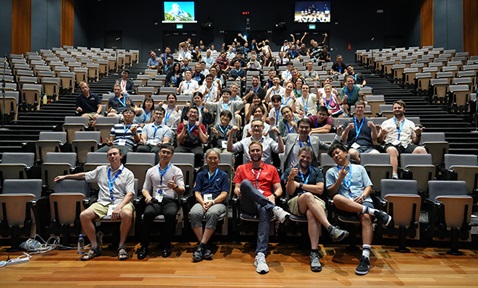PSLE revision: Mental preparation, time management strategies to ace exams
SINGAPORE – With the written papers in the Primary School Leaving Examination (PSLE) a month away, parents may be tempted to get their child to ramp up revision, but overdoing it now may be counterproductive and even lead to burnout and anxiety, experts say.
Pupils may feel overwhelmed by the sheer amount of material that they need to revise in the lead up to the PSLE, says Associate Professor Gregory Liem from the National Institute of Education, who teaches educational psychology.
To reduce the possibility of burnout by the end of September, he suggests that parents ensure their child has breaks during the day and quality sleep at night.
These few weeks should be spent on systematic and targeted preparation as this will help alleviate pupils’ anxiety and boost their self-confidence, he says.
“It’s time to gradually move away from the piles of practice papers and focus on the areas for improvement, and go through quick revision notes such as learning journals or mind maps,” says Prof Liem.
The Learning Lab’s science subject head for Tampines and Seletar, Ms Choo Xin Ying, suggests that pupils focus on revising important topics and concepts, instead of reading through long chapters in textbooks.
If they have difficulty recalling the facts, they can try creating simple mnemonics, for instance, using a short or interesting phrase or an acronym to help them remember information, she says.
It is important to spend time reflecting on the mistakes and lessons learnt from practice papers instead of attempting as many questions as possible, she adds.
Beyond content knowledge, Ms Choo Swee Heng, The Learning Lab’s mathematics lead subject head, says pupils should take time to reflect on the strategy used during the preliminary exam.
“For example, students should ask themselves if they could have avoided a careless mistake by allocating time to check or draw a model diagram or annotate keynotes on the side,” she says.
Both teachers agree that it is best not to attempt new practice papers or challenging questions a few days before the PSLE.
“New questions at this point may pose more stress. Opt for reviewing and re-attempting questions (where they made) mistakes,” advises Ms Choo Swee Heng.
Know the exam format, allocate time for answers
Besides brushing up on unfamiliar topics, pupils can familiarise themselves with the exam format.
Mr Jayce Or, founder of science enrichment centre Germinate Learning, says the science paper’s multiple-choice questions (MCQ) 1 to 14 are usually on life science topics and questions 15 to 28 on physical science topics.
Likewise for the open-ended section, questions 29 to 34 are usually on life science topics while questions 35 to 40 are physical science topics.
“For MCQ, focus on understanding the key concepts and definitions, and eliminate the wrong choices. Take note of the distractors, which are close but wrong answers, that may trip up pupils who are not strong in their understanding,” he says.
For open-ended questions, he suggests that pupils practise answering similar questions.
“Understand how to structure your answers and support them with the correct concepts,” he adds.
The second strategy is to have good time management during exams.
He suggests that since the science paper is one hour and 45 minutes, pupils can allocate 45 minutes for the 28 MCQ, and 45 minutes for the 12 open-ended questions, with 15 minutes for checking. This will give one to two minutes for each MCQ and three to four minutes for each open-ended question.
If pupils are stuck on a question, it is best to move on and come back to it later.
“Some years when the MCQ were tougher, some pupils spent too much time on those questions and could not finish the open-ended questions,” he says, advising that students leave time to check for careless mistakes and incomplete answers.
Casuarina Primary School’s head of mother tongue languages, Mr Mohamad Zareen Mohamed Shariff, agrees that time management is crucial.
For the Paper 1 component of the mother tongue language exam, in which pupils are expected to write a composition, he suggests dividing the 50 minutes into 10 minutes for planning, 35 minutes for writing and five minutes for checking.
How not to be bogged down by prelim exam results
Some pupils may feel that they have worked hard, and yet did not get the results they aimed for during the prelim exams.
Ms Shirley Sim, a senior school counsellor at Maris Stella High School (Primary), says parents can share stories of how they overcame disappointments in school and at work to encourage the child.
“Explicit assurances of unconditional parental support, regardless of results, is empowering. This is especially so for pupils with learning challenges or who struggle academically,” she says.
For children who did not put in enough effort, parents may have to step in to establish suitable routines.
“Sometimes, what appears to be lazy or unmotivated behaviour may be a reflection of pupils lacking skills like the ability to organise, plan, and manage time, or to start and complete assignments,” she says.
No matter the results, the way parents speak to children shapes the inner voice that children use to speak to themselves, says Ms Sim.
“Will it be one that focuses on strengths? Or will it be an inner critic that focuses on weaknesses and stunts learning?” she asks.
Having a kind inner voice goes a long way to build resilience, even for academically weaker pupils who may think that there is no point trying, she says.
Prof Liem says parents can also remind their child that schools may set the prelim exams in a way that allows the pupils to know their areas of weakness so as to better prepare themselves for the PSLE.
“With this sensible goal in mind, pupils would not be too disheartened when their prelim results fell short of their expectations,” he says.
Practical tips to motivate a child
Parents should ask their children why they feel that they have not done well in the prelim exams, says Prof Liem.
The factors they use to explain their performance will determine their subsequent motivation, he says, citing the Attribution Theory. The theory suggests that some of these factors are controllable while others are not.
For example, does a child feel that he or she did not do well because of factors such as effort, study strategies, time management and distractions – which are changeable?
Or does the child attribute the poor scores to innate ability, task difficulty or luck, which are not within his or her control?
Parents can help a child shift his or her perspective to the more controllable factors, to help him or her realise that the performance is within the child’s control, says Prof Liem.
“If a pupil believes that he or she performed poorly because he or she is ‘stupid’ or ‘unlucky’, adults could try to ask ‘are you sure you are not good at maths?’, ‘tell me how you studied for the maths prelims’ or ‘how many hours did you study?’” he suggests.
Knowing that achievement factors are within the child’s control will motivate him or her to study, says Prof Liem.
Another way is to work with the child to do time blocking: organise his or her time after school or during the September holidays based on three sets of activities – studying, resting and playing.
When a child has blocked off, for example, two hours for revision, he or she should focus without distractions. Assure the child that he or she can spend the next hour, for instance, playing a video game, listening to music or exercising.
“During the blocked-off hours, it is important that the child knows what he or she is to study and the goal to achieve. Only with this clarity would the child’s studying period be fruitful and the learning process effective,” he says.
The increase in self-belief when a child achieves his or her goals will give the young one the momentum in his or her studies, Prof Liem says.
Another way to motivate a child is to be specific in praising him or her.
Ms Emilyn See, a senior curriculum and teaching specialist at enrichment centre The Eton Academy, points out her students’ progress, not necessarily in their marks, and tells them she is proud of them.
“It could be growth in their confidence in reading, or how they remembered a concept I taught, or how they used a good writing technique for composition,” she says.
Another effective way to maintain motivation is to set achievable goals. For example, breaking down a task into small, specific goals will help pupils feel more in control as they work towards reaching each step.
Says Mr Or: “Try to aim for the next achievement level (AL) grade rather than a grade that is too far away. Setting achievable goals will give pupils a sense of accomplishment as they check off the steps.”
Also, encourage pupils to reward themselves with a small snack, for example, when they finish each task, rather than only when they complete their last paper, as having something to look forward to will keep them going, says Mr Or.
One last tip to spur children has little to do with actual studying. It is simply having good parent-child relationships, says senior school counsellor Ms Sim.
Parents must be intentional in connecting with their children and not focused on only getting more homework done.
One way is to continue to schedule mutually enjoyable activities such as outdoor activities, meals or a card game, Ms Sim suggests.
Parents can use casual conversations and experiences to get to know their pre-teens better.
“Students feel happy and supported when they see that parents listen to and care about their fears and challenges,” she says.
Calming strategies to deal with exam stress
Ms Sim says the issues that pupils face in the lead up to PSLE include anxiety, self-doubts and feeling upset with parents.
Latent stress over revision and performance, or a perceived lack of it, can strain the parent-child relationship, she notes.
Parents can help to mitigate the stress by reminding themselves and their child that no single exam is meant to define future success.
“The grades that our children achieve at PSLE are also not a reflection of our parenting abilities and strengths,” says Ms Sim.
Ms Teo Xiwen, head of mother tongue languages at Ahmad Ibrahim Primary School, agrees. “When parents understand that their child’s learning is a lifelong one, they are more inclined to see what their child has achieved at this point of time and celebrate it.”
There are simple ways to calm an anxious child.
One is the five-senses grounding exercise – getting the child to name five things he or she can see, touch, hear, smell and taste. This mindfulness exercise will help the child be more present and aware of his or her surroundings, and reduce feelings of anxiety or stress.
Another strategy is the 4-7-8 breathing exercise, a technique discovered by American doctor Andrew Weil who found that practising this way of breathing regularly can significantly reduce anxiety.
Get the child to inhale in four counts, hold the breath for seven counts and exhale for eight counts. Do three or four cycles each time, several times a day.
To reap the benefit of these techniques, it is best to practise them regularly before the exams, say Ms Sim and Prof Liem.
Madam Efizah Samat, head of department for science at West View Primary School, says another way to reduce stress is to encourage pupils to talk to trusted teachers or peers.
When she chats with her pupils, she reminds them of the phrase “excellence is not about being the best, but doing my best”.
As the final countdown to PSLE begins, educators have a common message for parents: Recognise the effort your child has put in, celebrate it and tell the child you love him or her no matter what.
As Ms Nur Sofhia Buang, head of department for mathematics at Jurong Primary School, puts it: “In the grand scheme of things, the PSLE is just one milestone in a pupil’s lifelong learning adventure. The AL score isn’t everything and doesn’t determine our pupils’ success and value.”
Source: The Straits Times © SPH Media Limited. Permission required for reproduction


.tmb-listing.jpg?Culture=en&sfvrsn=6330dcae_1)
-(1).tmb-listing.png?Culture=en&sfvrsn=1e533225_1)
.tmb-listing.jpg?Culture=en&sfvrsn=e21e2ff8_1)

